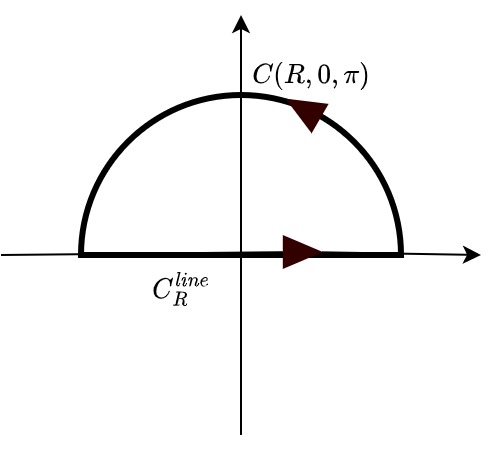Jordon's Lemma Claim 1 If \(zf(z)\rightarrow^{unif.} 0\) as \(z\rightarrow\infty\) , then
\[\lim_{R\rightarrow\infty} \int_{C(R,0,\pi)} f(z)dz = 0\]
where \(C(R,0,\pi)\) is the top semicircle arc of radius \(R\) centered at \(0\) , rotated ccw.
proof . Note that on the arc, \(|z| = R\) so that \(|zf(z)| = R |f(z)| \leq \kappa(R)\) so that \(|f(z)| \leq \frac{\kappa(R)}{R}\) .
Let \(\epsilon > 0\) . By definition of \(\kappa\) , take \(S\) s.t. \(\forall R > S. \kappa(R) < \frac{\epsilon}{\pi}\) . Then, with ML inequality we have
\[|\int_{C(R,0,\pi)} f(z)dz| \leq \pi R \frac{\kappa(R)}{R} < \epsilon\]
Example 1 Compute \(\int_{-\infty}^{\infty} (x^2 + 1)^{-1}dx\)
For any \(R > 0\) , expanding \(f\) to the complex domain, and consider
$$\int_{C} \frac{1}{z^2 + 1}dz = 2\pi i Res(f, i) = 2\pi i \frac{1}{2 i} = \pi $$ Also we have
\[\int_{C} f(z)dz = \int_{C^{line}_R} f(z)dz + \int_{C(R,0,\pi)}f(z)dz\]
Therefore, we can write
\[\lim_{R\rightarrow\infty} \int_{C} \frac{1}{z^2 + 1}dz = \lim_{R\rightarrow\infty} \int_{C^{line}_R} f(z)dz + \lim_{R\rightarrow\infty} \int_{C(R,0,\pi)}f(z)dz = \pi\]
Consider the latter term, because \(zf(z) = \frac{z}{z^2+1}\rightarrow^{unif} 0\) as \(z\rightarrow\infty\) , so that \(\lim_{R\rightarrow\infty} \int_{C(R,0,\pi)}f(z)dz = 0\) Note that
\[\lim_{R\rightarrow\infty} \int_{C^{line}_R} f(z)dz = \lim_{R\rightarrow\infty} \int_{-R}^R f(x)dx = \int_{-\infty}^\infty f(x)dx\]
so that
\[\pi = \int_{-\infty}^\infty \frac{1}{x^2 + 1}dx + 0\]
Jordon's Lemma IF \(f(z)\rightarrow^{unif} 0\) as \(z\rightarrow \infty\) and \(k > 0\) then
\[\lim_{R\rightarrow\infty} \int_{C(R, 0, \pi) } e^{ikz}f(z)dz = \lim_{R\rightarrow\infty} \int_{C(R, -\pi, 0) }e^{ikz}f(z)dz = 0\]
proof . parameterize \(C(R,0,\pi)\) with \(c(t):[0,\pi] \rightarrow \mathbb C, c(t)= Re^{it}\)
\[\begin{align*} I_R&:=|\int_{C(R,0,\pi)} e^{ikz} f(z)dz|\\ &= |\int_0^\pi e^{ikRe^{it}} f(Re^{it}) iRe^{it}dt|\\ &= R|\int_0^\pi e^{kR(i\cos t- \sin t)} f(Re^{it}) ie^{it}dt|\\ &\leq R \int_0^\pi |e^{kR(i\cos t)}|e^{-kR\sin t}||ie^{it}| |f(Re^{it})| dt\\ &= R \int_0^\pi e^{-kR\sin t}|f(Re^{it})| dt\\ &\leq R \kappa(R) \int_0^\pi e^{-kR\sin t} dt\\ &= R \kappa(R) 2 \int_0^{\pi/2} e^{-kR\sin t} dt\\ &\leq R \kappa(R) 2 \int_0^{\pi/2} e^{-kR\frac{2t}{\pi}} dt &\sin t\geq \frac{2t}{\pi}. \forall t \in [0, \pi/2]\\ &= 2R\kappa(R) \frac{\pi (1-e^{-\pi R})}{2Rk}\\ &\leq \frac{\pi}{k} \kappa(R) \end{align*}\]
Since \(\lim_{R\rightarrow\infty} \kappa(R) = 0, \lim_{R\rightarrow\infty} |I_R| = 0\)
The proof for the second equation is similar
Example \(\int_{-\infty}^\infty \frac{\cos x}{x^2+1}\)
First, expand to complex domain,
\[\frac{\cos z}{z^2+1} = \frac{1}{2}\frac{e^{iz}}{x^2+1} + \frac{1}{2}\frac{e^{-iz}}{x^2+1}\]
Let \(f_1(z) = \frac{e^{iz}}{x^2+1}, f_2(z) = \frac{e^{-iz}}{x^2+1}\) . We can compute \(f_1\) on the top semicircle, and \(f_2\) on the bottom semicircle.
\[\begin{align*} \lim_{R\rightarrow\infty}\oint_C f_1(z)dz &= \lim_{R\rightarrow\infty}\int_{C^{line}_R} f_1(z)dz + \lim_{R\rightarrow\infty}\int_{C(R, 0, \pi)} f_1(z)dz\\ Res(f_1, i) &= \int_{-\infty}^\infty \frac{e^{iz}}{x^2+1}dx + \lim_{R\rightarrow\infty}\int_{C(R, 0, \pi)} e^{iz}\frac{1}{x^2+1}dz\\ 2\pi i\lim_{z\rightarrow i} \frac{e^{iz}}{z+i} &= \int_{-\infty}^\infty \frac{e^{iz}}{x^2+1}dx + 0&\text{Jordon's Lemma}\\ \frac{\pi}{e} &= \int_{-\infty}^\infty \frac{e^{iz}}{x^2+1}dx \end{align*}\]
Simiarly,
\[\begin{align*} \lim_{R\rightarrow\infty}\oint_C f_2(z)dz &= \lim_{R\rightarrow\infty}\int_{-C^{line}_R} f_2(z)dz + \lim_{R\rightarrow\infty}\int_{C(R, -\pi, 0)} f_2(z)dz\\ Res(f_2, -i) &= -\int_{-\infty}^\infty \frac{e^{-iz}}{x^2+1}dx + \lim_{R\rightarrow\infty}\int_{C(R, -\pi, 0)} e^{-iz}\frac{1}{x^2+1}dz\\ 2\pi i\lim_{z\rightarrow -i} \frac{e^{-iz}}{z-i} &= -\int_{-\infty}^\infty \frac{e^{-iz}}{x^2+1}dx + 0&\text{Jordon's Lemma}\\ \frac{\pi}{e} &= \int_{-\infty}^\infty \frac{e^{-iz}}{x^2+1}dx \end{align*}\]
Therefore,
\[\frac{\cos z}{z^2+1} = \frac{1}{2}(2\frac{\pi}{e}) = \frac{\pi}{e}\]
Another convinient way is to notice
\[\int_{-\infty}^\infty \frac{e^{ix}}{x^2+1}dx =\int_{-\infty}^\infty \frac{\cos x}{x^2+1}dx + i\int_{-\infty}^\infty \frac{\sin x}{x^2+1}dx \]
Because \(\frac{\sin x}{x^2+1}\) is odd around 0, \(\int_{-\infty}^\infty \frac{\sin x}{x^2+1}dx = 0\) and we are left with
\[\frac{\pi}{e} = \int_{-\infty}^\infty \frac{e^{ix}}{x^2+1}dx =\int_{-\infty}^\infty \frac{\cos x}{x^2+1}dx\]
January 11, 2025 January 9, 2023 